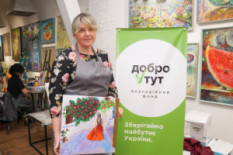You can listen to the full podcast here, but for now, you have the opportunity to read its main messages.
The Ukraine Reborn Association, led by my guest Nadia Olarean, is dedicated to helping Ukrainian asylum seekers in Switzerland. It offers various integration and socialization events for children and adults, such as courses, consultations, and psychological support in two cantons - Geneva and Vaud. Geneva is the largest center of the association, created based on GеCARE Ukraine, while Lausanne has the largest center supported by three Anglican churches. Over the past year, the association has assisted approximately 5,000 people.
More about the opportunities provided by the Ukraine Reborn Association can be found on the organization's website and in an interview published on the DestiNation website.
As I mentioned in my previous blog, I actively cooperate with this association, specifically assisting Ukrainian immigrants in finding employment and providing psychological support. It has been a valuable experience for me.
During the podcast, we did not cover everything the association does; instead, we mainly focused on Nadia's personal experience. She has been living in Geneva since 2018 and talked about the role of volunteering in integration and life in general.
Nadia Olarean was born and raised in Donetsk, has lived in five countries, and has over 15 years of professional experience, with the first 12 years as a marketing and business manager in corporate settings. In 2019, after obtaining a second degree in international law, she started working in the humanitarian sector. So, she has significant experience in integration and the necessary expertise to organize assistance for Ukrainian refugees at a needed level.
About Integration:
Nadia mentioned that despite her extended stay in Geneva, she still doesn't feel fully integrated. Moreover, she is unsure if she will ever integrate completely.
"Integration is when you feel like a full-fledged member of society, have certain rights, or understand that you can influence the country's life like its citizens. I don't have this feeling," Nadia pointed out. "However, I sense that this is 'my place' now."
"Integration is when you feel like a full-fledged member of society, have certain rights, or understand that you can influence the country's life like its citizens. I don't have this feeling," Nadia pointed out. "However, the feeling that this is 'my place' has already emerged."
Integration is helped by:
- The ability to communicate in the local language, even if not perfectly, but being able to speak and understand.
- Knowledge of how the Swiss system works and this country's accepted laws and customs.
- A sense of humor, which should be applied to circumstances and oneself.
- Networking and recommendations, which are especially important for finding employment.
- Volunteering activity.
"When you have a certain understanding of how society functions, it becomes more comfortable. For example, in Switzerland, it is not customary to intrude on someone's personal space; they respect it. This is not very typical for Ukrainians. We like to give advice, intervene, and insist, even if we are not asked. And this can hinder socialization. Integration also helps in realizing the fact that no country is perfect. I had a very idealized perception of Switzerland; I came here wearing rose-colored glasses. Everything here seemed to be at the top level - the organization of life, innovations... But when I started dealing with extensive bureaucracy, conservatism, and many things that happen very slowly here, it caused frustration. It drove me crazy... Until I realized that I need to accept reality. As a result, you need to accept certain peculiarities. Accept that this is precisely how the country is, it's the reality."
Advice: If you find yourself in a country where the number of positives outweighs the negatives and plan to stay there, you should get used to the negatives and move on. For example, you can accept how bureaucracy works here, and instead of getting nervous or expressing dissatisfaction, simply allocate more time to it.
"Once I decided that since I am not a citizen of this country and it doesn't matter whether I pay taxes or not, this is not my home," Nadia explained. "As a result, I don't have the right to come into someone else's home and dictate my rules. Of course, I can share my perspective when asked or if I create such a context where people can hear me. But I cannot impose my opinion."
Regarding essential aspects to consider for socialization, we emphasized the role of networking and recommendations for finding employment in Switzerland. This is a moment that everyone who wants to find a job here should work on. Simply, it involves attending various events, parties, and centers, getting to know people, and socializing. This significantly facilitates the integration process.
About Volunteering and Its Healing Role
Despite her pregnancy, Nadia volunteered from the early days of the war, initially coordinating volunteers. But very quickly, she, together with her friend and now co-founder of the association, Liubov Bondarenko, concluded that Ukrainian asylum seekers in Switzerland lacked sufficient humanitarian assistance. When our women with children arrive, fleeing from the war, they are very lost. They don't know where to go, what to do, how to act. And this is where they need tremendous support. That's how creating an association to help them was born. Coming together with friends, they established the association, which quickly became active.
And here, we came to a very important topic - the role of volunteering in integration and its healing properties for volunteers.
"For the first time, I felt the healing impact of volunteering when I participated in a psychological self-development group. It was a long-term course; part was a volunteer project we had to create at the end of our sessions. When we completed it, I realized that it was needed, first and foremost, for us. The satisfaction and feelings I had after accomplishing our goal, the way we helped people, were incredible," Nadia shared. "In such moments, you deeply feel involved in something significant... I greatly respect the business world, but working there doesn't always give you the sense of doing something significant... This was my first experience like this."
From my experience, volunteering is a powerful tool for personal development. But it is also an opportunity to meet incredible people. Working in the association, Nadia and other volunteers have met hundreds of remarkable individuals from various walks of life and social strata. The idea of helping others united all these people, and it left a powerful impression. We all genuinely felt that by providing support, we were also helping ourselves.
"We work a lot with volunteers who teach at our integration centers. They are incredible, and the teachers have been with us from day one. The way they interact with visitors, their dedication to the cause, and their perspectives on life are incredibly inspiring, just amazing!"
Volunteering is a great tool for healing. Therefore, because of the war, Ukrainians here should also engage in it. Because as I mentioned, we help ourselves by helping others, communicating with incredible people, and feeling that we are doing something important together.
However, one must consider one's limits to avoid burnout. Volunteering is fantastic and crucial, but it can be addictive, like a drug. And this poses certain risks.
"It's amazing to see how you have helped someone, how something has changed. It inspires you to do even more, and then you may feel that you no longer have the strength at some point," Nadia emphasized.
Therefore, when volunteering, it is essential to remember to take care of oneself. If you take care of yourself, taking care of others will be much easier.
Now we understand that the war, unfortunately, will last for a long time, and our help will be needed for an extended period. Therefore, we need to be capable of continuing our activities. Another essential task now is to think about how to unite for Ukraine's future restoration and rebuilding. It will require all of our experience and a lot of effort.







